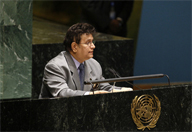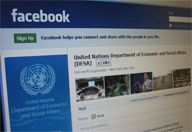
The General Assembly’s Second Committee has many pressing issues to address this fall including poverty eradication, agriculture development and energy efficiency. A new agenda item on “People’s empowerment and a peace-centric development model” has also been introduced. DESA News spoke with Ambassador Abulkalam Abdul Momen, who leads this important work.
On 3 October, Ambassador Momen opened his first official meeting as the Chair of the Economic and Financial Committee, also known as the Second Committee. Pleased with the way the work has started and with a very optimistic outlook, Ambassador Momen shares his thoughts on the tasks ahead this fall. He highlights sustainable development and the Monterrey Consensus as some of the areas where he would like to see more consensus and talks about expected resolutions on price volatility, transition of landlocked countries and on coral reefs. He also gives praise to the Member States for their inventiveness when they addressed critical issues during the general debate.
The Committee addresses many important issues including macroeconomic policy questions, IT for development, food security and sustainable development; is there any matter that you see as more pressing and in need of more attention?
“We do discuss all of these issues. And in addition, we have a special focus this fall on the LDC-IV follow up and on Rio+20. There is also a new item this year on “People’s empowerment: A Peace model”. Critical for people’s empowerment is their participation in governance, to eliminate poverty and hunger and empower them with jobs and education. If we can empower people, they will be capable of making decisions that will bring lasting peace and prosperity. We will also need to include ‘the excluded’, to eliminate all forms of discrimination, provide education, enhance manpower development and to end terrorism in all forms.”
Are you pleased with the way the work of the Committee has started?
“Yes, I am very pleased with the work and it started smoothly due to very good consensus and understanding within the Bureau members and of course, the Secretariat.”
What did you think about the general debate and the issues addressed by Member States?
“I was very impressed. The representatives are addressing many relevant issues and I have also noted that they are coming up with new ideas and innovative ways to address critical issues and challenges, for example on the financing of LDC IV program of action and escalation of food prices.”
Are there any particular issues where you want to see more consensus among Member States?
“I would love to see more consensus, specifically on sustainable development. Creating a sustainable institutional framework would enable us to move forward in a cohesive way to achieving sustainable development goals through building blocks and bridges. The commitments that have been made over the years need to be materialized on the ground and these are the ‘building blocks’ essential for sustainable development. There has to be consensus on a holistic approach between the major pillars of sustainable development like (1) economic sustainability, (2) environmental sustainability and (3) social sustainability. Secondly, on the LDC-IV follow up, I want continuous monitoring and follow up. Thirdly, and long overdue, is a framework for monitoring and following up on the Monterrey Consensus.”
What do you see as the main challenges for the Committee and its work this session?
“Reaching consensus on the Monterrey framework, COP 17 and getting a legally binding agreement on climate issues. Transfer of technology is also a challenge and how we can pass this on from the private sector to the Least Developed Countries.”
Sustainable Development; promotion of new and renewable sources of energy; green economy – are all matters of high priority. Can we expect that the work of the Committee will help push these matters forward?
“We are working towards pushing these matters forward. We have many resolutions coming up including on price volatility, transition of landlocked countries, COP 17 and a new resolution on coral reefs. There will also be a new resolution on agricultural development and people’s empowerment. It is also interesting that we are working with ECOSOC on ‘brainstorming job-rich growth model for development’ and cyber crime prevention. This is the first time that the Second Committee and ECOSOC are jointly arranging a Special event on the ‘current global economic challenges’.”
Other important items before the Committee under “Sustainable Development” include “International Strategy for Disaster Reduction” and “Protection of global climate for present and future generations of humankind”; what outcomes can the international community hope for?
“I am always an optimist. I have no doubt that humanity can meet these challenges. We need to keep the general public aware of these issues. There are also some misconceptions about the scientific findings on climate change and a need to get the facts right. We will work more towards facing these challenges together and on raising public awareness.”
How will the Committee assist in the preparations for Rio+20?
“We are very much involved. The Committee works with others to minimize duplicity. We welcome the Secretary General’s High-powered panel on Global Sustainability and look forward to their recommendations and focus.”
How far have we come in implementing what was decided at the UN Conference on Financing for Development in Monterrey 2002; and in Doha 2008 respectively?
“Much more is needed. These are critical issues. Other issues are lagging behind because of this. Without adequate, predictable and timely financing, many programs and goals will remain unimplemented. If we fail to implement, we may lose credibility. Implementation is very important. ”
There are a number of side events arranged by the Committee; can you highlight some of them?
“We are organizing Special events in six areas; (1) Alternative development strategies for job creation; (2) Financing for development; (3) The follow-up to the LDC IV Conference; (4) Peoples-empowerment: a Peace Model for sustainable development; (5) Food and energy security and energy efficiency; and (6) Means of implementation for sustainable development. We are also organizing together with ECOSOC a joint panel discussion for the first time in history on ‘Investing in productive capacities for job-rich growth’.
Although GDP growth rates in many countries are relatively comfortable and the profit margin for a few sectors, for example, in the USA is very lucrative, unfortunately not that many jobs are being created. We therefore want to have a brainstorming session on job-rich growth model. During the current economic and financial crises, one after another, many traditional global leaders and leaders of international financial institutions, however, remained rather quiet and they failed to come up with effective policy prescription either to enhance or regain global confidence or to guide them with a roadmap. Therefore, it created a vacuum and the UN and ECOSOC should come forward to take up these challenges and enhance global confidence. Secondly, without implementation of internationally agreed programs and goals on the ground, we cannot achieve goals neither can we enhance hopes and dreams of teeming millions. To implement programs and goals, in addition to leadership commitment and hard work, we need adequate, predictable and timely financing. As to how to get there, we are organizing these brainstorming events.”
Having served as the Permanent Representative of Bangladesh to the UN since 2009 and also as the President of the UNICEF Executive Board in 2010, Ambassador Momen has a diverse background within the economic and business fields with a Doctor’s degree from Northeastern University and three Master’s degrees from Harvard, Northeastern and Dhaka Universities besides a Law degree. He has chaired the Department of Economics and Business Administration at Framingham State University, served as Expert Economic Adviser to the Saudi Industrial Development Fund (SIDF), Ministry of Finance and National Economy, and held a number of positions within the Government of Bangladesh.
For more information: Economic and Financial Committee (Second Committee): http://www.un.org/en/ga/second/index.shtml
Biographical note on Ambassador Momen: http://www.un.org/News/Press/docs/2011/bio4320.doc.htm

